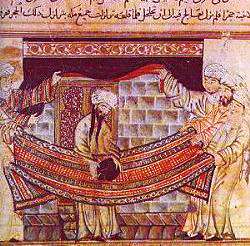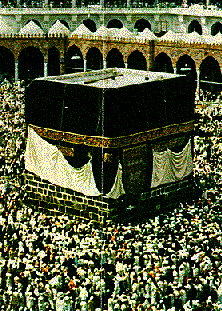|
Rotten Library > Religion > Islam
Islam Islam is the second largest religion in the world after Christianity, and it's gaining fast.
Islam is the second largest religion in the world after Christianity, and it's gaining fast. There are between 1 and 1.5 billion Muslims in the world. Despite the impression you may have gotten, the vast majority of Muslims are non-Arabs. Islam is the dominant religion across much of Asia, North Africa and the Middle East. Islam means "submission", specifically total submission to the word of God as recorded in the Koran (or Quran) by the Prophet Muhammad, a message delivered in 7th century and believed to be God's final revelation to humankind. Muslims believe the Koran is God's word exactly as told to Muhammad, without elaboration or creative input from the Prophet himself. After the Koran, there are secondary texts known as hadiths, which are stories of the Prophet's life and times. Although most Muslims emulate Muhammad's way of life (sunna) as outlined in the hadiths, these texts are not considered as unreproachable as the Koran, and different Islamic sects sometimes endorse different or incompatible hadiths.
In addition to the pillars, there are numerous injunctions about behavior and custom laid out in the Koran and elaborated on by the hadiths and in religious rulings known as fatwas. Muslims are forbidden to eat pork, and other meats must be ritually prepared in order to be considered halal. Gambling and drinking are forbidden, and ritual ablutions are required, among many other rules applied to daily life. Daily prayers are said facing the Saudi city of Mecca, where stands a house of worship that legend says was built by the biblical figure Abraham, who is one of the prophets of Islam. Mecca and Jerusalem are sacred in Islam, because the Quran indicates that Muhammad was mystically transported to each, where sections of the Quran were revealed to him. As in other religions, there is a Day of Judgment, after which unbelievers roast in Hell for eternity, while the souls of believers are rewarded by transport to a sensual paradise with food, wine and pleasures of the flesh in ample supply. Husbands and wives are also reunited in paradise.
Islam recognizes previous prophets, including Moses, Abraham and Jesus, although the latter is accorded no divine status. There are sections in the Koran discussing the earlier prophets, but they aren't the same as the traditions related in Jewish and Christian literature. The Koran says that Jesus was not crucified, but that someone else died in his place (similar to the beliefs held by some Gnostics. Most Muslims also honor the Virgin Mary. Muhammad led several highly successful campaigns of conquest, and in the later part of his life, the Koran reflected this political status, encompasing a broad array of civic issues. As a result, Islam is an overtly political religion. Its adherents are required to seek political justice, and some Muslims believe the only way to do that is to establish Muslim states that enforce Sharia law.
After Muhammad's death, Muslims were led by a series of caliphs. The Shi'a believe that the caliphate could only appropriately pass to the descendants of Ali, the son-in-law of Muhammad, but the Sunnis believe caliphs can be chosen by the community. After the initial rift over the caliphate, other doctrinal differences eventually arose. Both the Sunni and Shi'a movements spawned a number of splinter groups themselves. The Shi'a gave birth to Ismailism, which led to the Assassin cult that played a key role in the Crusades. Another major movement is Sufism, a mystical branch of Islam responsible for great controversy within Islamic culture as well as some of history's greatest works of literature. Within a couple hundred years of Islam's birth, a "back to the roots" movement began. Basically, Islamic fundamentalism is substantially different from its Christian counterpart. Christian fundamentalism, for all its at-times regressive views, is an essentially modern interpretation of the Bible. There's no real historical basis for the notions embraced by groups like the Assemblies of God. In contrast, Islamic fundamentalism is explicitly and authentically anti-modern. Fundamentalist sects such as the Wahhabis, believe that Islam can only be kept pure when Muslims model their lives as closely as possible on Muhammad's example. The Wahhabis reject almost every form of religious and social modernization or innovation since about 950 A.D.
Jihad has become one of the most difficult and contentious issues facing Muslims today. From Islam's earliest days, Muslims have almost continuously been in conflict -- with Crusaders, with Mongols and frequently among themselves. Some of these conflicts were the result of outside threats; others were the sort of empire-building that is fairly typical in any historical setting. Jihad translates from Arabic as "struggle." While modern, moderate Muslims have tried to promote a definition of jihad that focuses primarily on a personal and collective struggle for spiritual improvement, the traditional concept of holy war has more currency around the world, for reasons which are perhaps obvious. Depending on who you're talking to, there are several possible justifications for jihad, including to rescue oppressed Muslims or to reclaim lands that were once Islamic (which includes the Middle East, and much of central and South Asia) from so-called "infidel" influence. The definition of infidel is also extremely fluid, and can include Jews, Christians and even Muslims. Although fundamentalism is considered out of the "mainstream" of Islamic thinking, fundamentalist sects have been successful recruiting in war-torn and poverty-stricken regions of the world. Wealthy Saudi Wahhabis have furthered that expansion, by funding madrassas, religious schools preaching the Saudi brand of fundamentalist Islam. Partly driven by the growth of fundamentalism, Islam has become the fastest-growing religion in the world. Because of the militant views held by some Islamic fundamentalists, many Westerners perceive Islam as a violent religion, which isn't really fair. For one thing, a very small percentage of the aforementioned 1.5 billion Muslims are terrorists or guerrilla fighters. However, the terrorists get all the press and are among the most active in converting Westerners to Islam, so you can't quite discount the extreme elements when discussing the religion. Like it or not, the extremists are very much driving the modern perception of Muslims, both within Islam and without. On the bright side, Islam is only 1,300 years old, and religions have a definite life-cycle, just like people. If you look at Christianity in 1300 C.E., two words spring to mind: Inquisition and Crusade. Maybe the 1300s are just the rebellious teenage years.
|
 There are five key criteria for being Muslim, known as the "five pillars of Islam", which include:
There are five key criteria for being Muslim, known as the "five pillars of Islam", which include:
 Muslim men are allowed to have more than one wife, but they are required to treat all their wives equally, an admonition that discourages many would-be polygamists. Although cultural mores in many Muslim cultures tend to be repressive to women, very little actual oppression is based in the real theology of Islam (this varies from sect to sect).
Muslim men are allowed to have more than one wife, but they are required to treat all their wives equally, an admonition that discourages many would-be polygamists. Although cultural mores in many Muslim cultures tend to be repressive to women, very little actual oppression is based in the real theology of Islam (this varies from sect to sect).  There are two major factions in Islam, known as Sunni and Shi'a. The original bone of contention between the two sects was a strictly political battle over the succession of power from Muhammad, but other differences developed over time.
There are two major factions in Islam, known as Sunni and Shi'a. The original bone of contention between the two sects was a strictly political battle over the succession of power from Muhammad, but other differences developed over time.  There are also militant, political and/or extremist forms of Islam -- some which are fundamentalist and others which are not. Some sects, like
There are also militant, political and/or extremist forms of Islam -- some which are fundamentalist and others which are not. Some sects, like